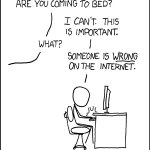
Growing up, one of my favorite books was Robert Pirsig’s Zen and the Art of Motorcycle Maintenance. It’s everything you want in a 1970 philosophy/spirituality diatribe. The book is a fictionalized autobiography of a 17-day motorcycle trip Pirsig made with his son Chris and, for part of the way, with friends. The journey experiences are interspersed with stories about the past of the protagonist, Phaedrus, whose relentless inquiry into the nature of Quality end up driving him insane. Phaedrus’ story reveals this inner journey, his descent into madness, and his destructive experience with electroconvulsive therapy (like Pirsig himself). Eventually, Phaedrus regains his personality and reclaims his close relationship with his son.
I don’t love the book now as much as I did back then; the main character is difficult to like, the classicism-over-emotions conclusion does not align with my values, and a lot of the stuff rings more pretentious to me now that I’m less impressionable than I was in my teens. But there is one fantastic gem in the book that I want to tell you about.
A starting point for Phaedrus’ journey has to do with his job. A professor at a small college, he tries to motivate his students to write well, but finds himself dismayed with the quality of their essays. He concludes:
Schools teach you to imitate. If you don’t imitate what the teacher wants you get a bad grade. Here, in college, it was more sophisticated, of course; you were supposed to imitate the teacher in such a way as to convince the teacher you were not imitating, but taking the essence of the instruction and going ahead with it on your own. That got you A’s. Originality on the other hand could get you anything…from A to F. The whole grading system cautioned against it.
He discussed this with a professor of psychology who lived next door to him, an extremely imaginative teacher, who said, “Right. Eliminate the whole degree-and-grading system and then you’ll get real education.”
Phaedrus ends up inviting a student to write an essay about what it would be like to study without grades. After thinking about it, she becomes a convert to the cause, but her classmates remain skeptical:
Phædrus’ argument for the abolition of the degree-and- grading system produced a nonplussed or negative reaction in all but a few students at first, since it seemed, on first judgment, to destroy the whole University system. One student laid it wide open when she said with complete candor, “Of course you can’t eliminate the degree and grading system. After all, that’s what we’re here for.”
She spoke the complete truth. The idea that the majority of students attend a university for an education independent of the degree and grades is a little hypocrisy everyone is happier not to expose. Occasionally some students do arrive for an education but rote and the mechanical nature of the institution soon converts them to a less idealistic attitude.
Intrigued, Phaedrus runs an experiment: he simply stops giving his students grades. Here’s how the experiment goes:
[A]t first almost everyone was sort of nonplussed. The majority probably figured they were stuck with some idealist who thought removal of grades would make them happier and thus work harder, when it was obvious that without grades everyone would just loaf. Many of the students with A records in previous quarters were contemptuous and angry at first, but because of their acquired self-discipline went ahead and did the work anyway. The B students and high-C students missed some of the early assignments or turned in sloppy work. Many of the low-C and D students didn’t even show up for class. At this time another teacher asked him what he was going to do about this lack of response.
Robert J. Pirsig, Zen and the Art of Motorcycle Maintenance (1974.)
“Outwait them,” he said.
His lack of harshness puzzled the students at first, then made them suspicious. Some began to ask sarcastic questions. These received soft answers and the lectures and speeches proceeded as usual, except with no grades.
Then a hoped-for phenomenon began. During the third or fourth week some of the A students began to get nervous and started to turn in superb work and hang around after class with questions that fished for some indication as to how they were doing. The B and high-C students began to notice this and work a little and bring up the quality of their papers to a more usual level. The low C, D and future F’s began to show up for class just to see what was going on.
After midquarter an even more hoped-for phenomenon took place. The Arated students lost their nervousness and became active participants in everything that went on with a friendliness that was uncommon in a gradegetting class. At this point the B and C students were in a panic, and turned in stuff that looked as though they’d spent hours of painstaking work on it. The D’s and F’s turned in satisfactory assignments.
In the final weeks of the quarter, a time when normally everyone knows what his grade will be and just sits back half asleep, Phædrus was getting a kind of class participation that made other teachers take notice. The B’s and C’s had joined the A’s in friendly free-for-all discussion that made the class seem like a successful party. Only the D’s and F’s sat frozen in their chairs, in a complete internal panic.
The phenomenon of relaxation and friendliness was explained later by a couple of students who told him, “A lot of us got together outside of class to try to figure out how to beat this system. Everyone decided the best way was just to figure you were going to fail and then go ahead and do what you could anyway. Then you start to relax. Otherwise you go out of your mind!”
The students added that once you got used to it it wasn’t so bad, you were more interested in the subject matter, but repeated that it wasn’t easy to get used to.
I’ll leave it to you to read the book and find out what happened next.
The reason I was reminded of these captivating passages: Today I recorded the review session lecture for my criminal procedure students, who are taking my exam early next week. Under our College’s pandemic grading policy, everyone will receive a credit/no-credit grade for their efforts.
When we voted on this policy, there were many opinions among the faculty and the students about which grading system would accomplish the most in terms of fairness, compassion, and support of our students’ success. Excellent arguments were made on all sides in good faith. And now I’m running a twisted version of Phaedrus’ experiment, with my previous cohorts as my control group. I say “twisted” because this isn’t an experiment, or a game: we are facing extremely unusual circumstances. Financial, medical and psychological factors impact our students in a variety of ways, weighing heavier against students who come to us from less social/financial advantage to begin with. I am committed to reading all the exams with great attention, and I think they have much to teach me, but because there are so many unknown factors, I’m going to take the outcomes with more than a grain of salt.
But I do have a message to students–not just my students, but anyone who finds themselves toiling this final exam season without the usual external motivator of getting good grades. Even though writing a good exam (which I will read) and doing well on the course can eventually pay off in the world of external rewards in the form of, say, a recommendation letter to a future employer, you have been given a much bigger gift.
The only person you have to impress is yourself.
You have three hours to impress yourself with how much you’ve learned this semester, with your knowledge of the doctrine, with your analytical skills, with your creativity, with your penchant for problem-solving, with your organizational skills. Amidst the fear and anger and grief, there will be a bubble of freedom from assessment, in which you can grow and thrive–just for the pleasure of witnessing your own accomplishment. You have been gifted an interesting and challenging puzzle to work at quietly, on your own, without anyone critiquing you or breathing down your neck. You have been gifted the thrill of quietly marveling, without an audience, at your own mastery. You have been gifted the opportunity to shine unseen, where your spark is its own reward, in a time and space free of expectations.
I know some of you are facing very real difficulties this exam season: even having a quiet spot to take an exam with working Internet is not a given. And I also know that it is extremely emotionally hard to take on projects, and that it can feel like a huge presumption to tell you that a scary, negative experience is a gift. Only you know what it means *for you* to excel, or to rise to the occasion, given what is on your plate in this scary time. But to the extent that you have control over your circumstances and surroundings, and to the extent that your emotional bandwidth allows, ask yourself: Do you want a grade and a degree, or real education?
It’s completely up to you. No judgment from me or from anyone else.
What will you do with this gift?




No comment yet, add your voice below!